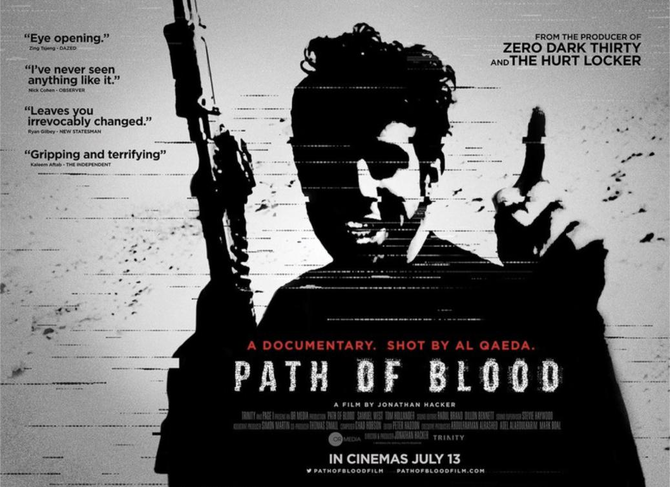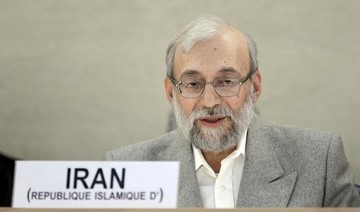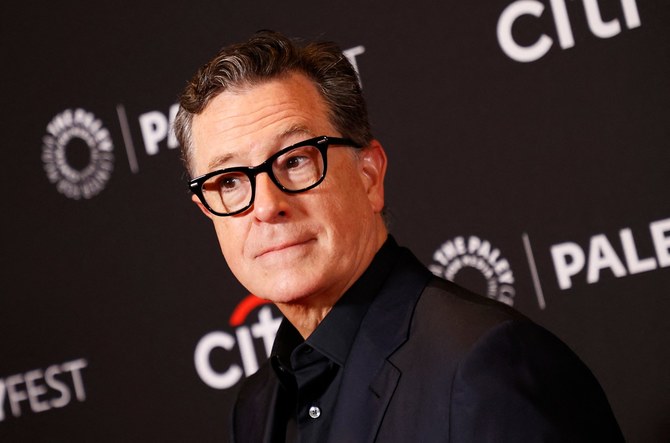ANNA PUKAS, LONDON: As the film opens this could be just a normal gathering of young men, exchanging banter and laughing. Only the Kalashnikovs and rocket launchers they brandish shows this is no ordinary get-together.
An unseen voice speaks of the boys’ “humble, radiant faces.” In fact their heads are swathed in keffiyehs, leaving only their eyes visible. Only one man’s face is uncovered.
His name is Ali and this is his “suicide video,” filmed before he drives a truck packed with explosives into the General Directorate of Traffic in Riyadh.
There have been numerous documentaries about terrorists. Their stories have also been told in fictional form. This film draws its material from a source that has rarely been tapped before: The Saudi intelligence service.
Six years ago, two highly respected Saudi journalists, Abdulrahman Al-Rashed and Adel Al-Abdulkarim, heard about the existence of a large stash of video footage on Al-Qaeda’s operations inside Saudi Arabia between 2003 and 2009. Some were home movies shot by Al-Qaeda operatives themselves and seized by the Saudi authorities in their raids on terrorist cells. Some material was shot by the police as they carried out their raids.
After long negotiations with the head of security services at the time, Al-Rashed and Al-Abdulkarim were given access to 500 hours of footage.
This has been edited down to 90 minutes. The resulting film, “Path of Blood,” goes on release in the UK and the US on July 13. Al-Rashed and Al-Abdulkarim, of OR Media co-produced the film with Thomas Small and Jonathan Hacker, who also directed.
In the first decade of the century, Al-Qaeda focused its attention on Saudi Arabia, waging a campaign of bombings and hostage-taking.
“Path of Blood” reveals, as never before, the daily life and thoughts of Al-Qaeda’s brainwashed foot soldiers as they prepare for their missions.
You might imagine young men who are facing imminent death might appear to be subdued and thoughtful. Far from it.

At a desert training camp, they hold wheelbarrow races, behaving like boys at a school sports day, one team protesting loudly when the referee declares another pair the winners.
One bashful boy asks for the film to be deleted, as he is worried about flashing his underwear on camera.
They wink and smile at the camera and worry about how they look. In their suicide videos, they forget their scripted lines.
At times, the film descends into farce. One Al-Qaeda operative runs out of petrol on his way to a mission and has no money on him.
In the opening scenes with Ali, the suicide bomber-to-be, the unseen interviewer asks him for his response to those who say that killing “the Crusaders” is against the teachings of Islam. Ali says he doesn’t understand the question.
The interviewer rephrases the question. Ali (real name: Abdulaziz Al-Mudayish) replies that he “wasn’t briefed” on this and suggests they would get on better if the questioner didn’t use such long words and kept the questions short. But Ali also keeps being distracted by the goings-on off camera and falls about laughing.
The interviewer first rebukes him gently for not concentrating but ends up threatening to slap him.

Having been granted access to the films, the production team were faced with the huge task of putting it all into some kind of sequence.
“All the Al-Qaeda tapes were still in the original suitcases they were found in. None of it had been logged,” said director Jonathan Hacker. “There were no dates or identifiers on any of it. We had to work out who all the characters were.”
The amateurish quality of the footage was also a concern. The sound quality was poor and the participants spoke regional Saudi dialect with a good deal of slang, which demanded careful translation. But the compelling content overrode all other concerns.
“We were behind the scenes with Al-Qaeda, with an intimacy that you would never have dreamed of seeing,” he said.
The team decided early on not to include any editorializing by “talking head” expert analysts. Instead a spare commentary, narrated by British actor Samuel West, just clarifies what is happening for the viewer. Actor Tom Hollander narrates extracts from the Al-Qaeda magazine Voice of Jihad.
The raw footage included intensely gruesome scenes of brutality and bloodshed, including the beheading in June 2004 of Paul Marshall Johnson Jr., an American working for the Advanced Electronic Company who was kidnapped by an Al-Qaeda cell commanded by Abdul Aziz Al-Muqrin in Riyadh. Johnson is shown, blindfolded and terrified but the screen goes black as his captors beat him.

“It was important to show the bodies of victims after an attack, to show the consequences of a bomb,” said Small. “We refused to show victims’ faces. However, we don’t owe the same consideration to the terrorists.”
For all their bravado, the viewer is left with the strong impression that the Al-Qaeda recruits really do not understand what they have got themselves into. For some, their gullibility cannot even be explained by youth — Ali, the class clown, is 33. Yet the viewer is left almost feeling sorry for them, for the waste of life and for how they are deceived by the men who rarely show their own faces on film.
This manipulation of unworldly men of simple mind is not limited to Al-Qaeda-inspired terrorism, said Small.
“They have little education and they are easy to manipulate. There must also be a certain vanity that’s not being satisfied, a need to feel important. That feeling is also in those guys who shoot up schools in America or in football hooligans. Stupid, vain, easily manipulated young men — it’s a universal phenomenon.”
The production team consulted Saudi security forces but to their surprise, they were not required to “clear” the film with the Saudi authorities.
“We held a screening for some of the intelligence officers, the ordinary guys who conduct the raids. When it came to the part with Paul Marshall Johnson, they cried over what their compatriots had done,” said Hacker.
One of the main messages of the film is that the principal victims of the extremists are not “infidels” but their fellow Muslims.

“After 9/11, there was a belief that it was Islam versus the West, but the West is a sideshow,” said Small. “The victims are Muslims and those combatting the terrorists are Muslims. This is a Muslim story.”
For 15 years Saudi Arabia has run a rehabilitation program for offenders arrested on terrorism grounds. It has an impressively low level of repeat offenders.
“They are proud of the program and rightly so,” said Small. “Eighty percent renounce radicalism and 20 percent lapse in some way, which is very low compared to similar programs.”
Whether “Path of Blood” will be shown in Saudi Arabia’s newly-opened cinemas is open to question. But it will soon be available to download.
As one clearly nervous Al-Qaeda recruit prepares to make his suicide video, he says: “I feel like the whole world is watching.”
It is now.
















 Based in the company’s Riyadh office, Al-Shathri will be responsible for accelerating business growth in Saudi Arabia and building the operational business and community.
Based in the company’s Riyadh office, Al-Shathri will be responsible for accelerating business growth in Saudi Arabia and building the operational business and community.







